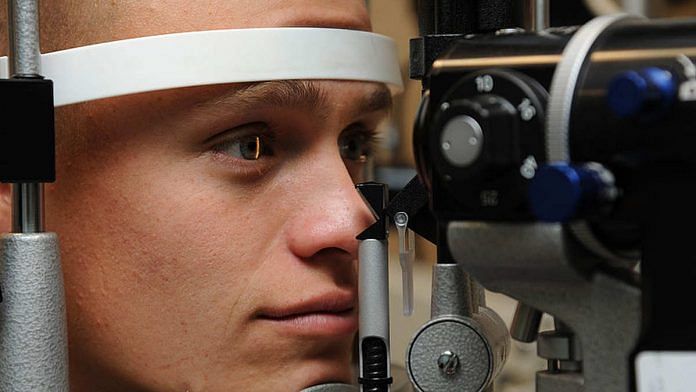New Delhi: The US Food and Drug Administration (FDA) Tuesday approved a drug, which is the first medicine validated by the American health regulator to treat thyroid eye disease (TED).
This disease is a condition in which the muscles and fatty tissues behind the eyes become inflamed, causing the eyes to bulge outward.
The medicine is called Tepezza, manufactured by Irish drugmaker Horizon Therapeutics.
“The approval represents the first drug approved for the treatment of thyroid eye disease. Approval marks an important milestone for the treatment of thyroid eye disease,” said Wiley Chambers, deputy director, division of transplant and ophthalmology products, FDA’s Center for Drug Evaluation and Research, in a FDA statement.
The drug has received the designation of ‘Orphan Drug’, “which provides incentives to assist and encourage the development of drugs for rare diseases or conditions”, the statement said.
On TED, the US regulator said it’s a “rare” condition, but an Indian health practitioner says the disease is quite common.
“The disease is not a rare condition. Rather, such cases are common in public hospitals set up like ours,” said Jeewan Singh Titiyal, chairman of National Eye Bank at AIIMS, New Delhi.
Titiyal welcomed the FDA move as there is no “direct medicine to cure the disease”.
At present, there are very limited options to treat the disease. Some of these options include anti-thyroid medications, radioactive iodine, surgery to remove thyroid gland and replacement of thyroid hormone.
Also read: Indian pharma firm Strides tried to destroy quality records ahead of US FDA inspection
How the drug was approved
Tepezza has been approved on the basis of the results of two studies — Study 1 and 2, said the FDA statement.
Both studies had a total of 170 patients with active thyroid eye disease who were “randomised to either receive Tepezza or a placebo”, which is a dummy or inactive pill.
“Of the patients who were administered Tepezza, 71 per cent in Study 1 and 83 per cent in Study 2 demonstrated a greater than 2 millimeter reduction in proptosis or bulging as compared to 20 per cent and 10 per cent of subjects who received placebo, respectively,” the FDA said.
The treatment through Tepezza, however, reported some side-effects in patients, including muscle spasms, nausea, hair loss, diarrhea, fatigue, high blood sugar, hearing loss, dry skin, altered sense of taste and headache.
After approval of drugs by the US FDA, Indian manufacturers, as a routine process, file applications before the Central Drugs Standard Control Organisation (CDSCO) to take permission to manufacture the same formulation.
The CDSCO, which is India’s drug regulator, then orders for the clinical trial of the drugs on more than 100 patients at four different locations. The process takes at least two to three years and then the drugs are launched in the market.
What is TED?
Also known as graves ophthalmology, the TED is associated with “outward bulging” of the eye that can cause a variety of symptoms such as eye pain, double vision, light sensitivity or difficulty in closing the eye, the FDA said.
According to the doctors at Medanta Healthcare, “It is an autoimmune condition where the thyroid gland mistakenly senses malignant cells and releases antibodies to resist against those bad cells. Since there are no bad cells, the released antibodies end up fusing with muscles in the eyes, causing the onset of the disease.”
The disease can be incapacitating as well, the FDA said.
“For example, the troubling ocular symptoms can lead to the progressive inability of people with thyroid eye disease to perform important daily activities, such as driving or working.”
Also read: Indian drugmakers aren’t losing sleep despite getting a record 23 warnings from US FDA



